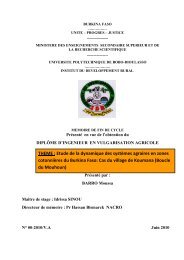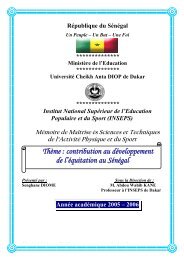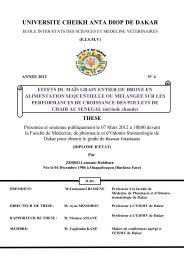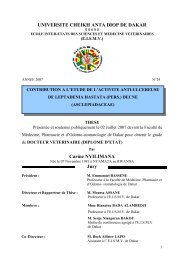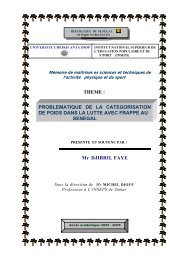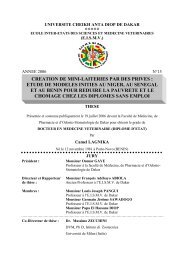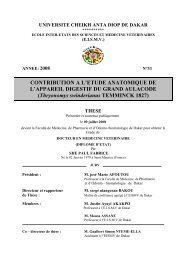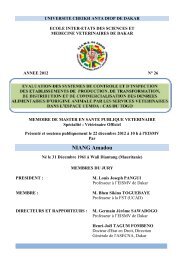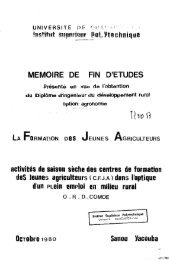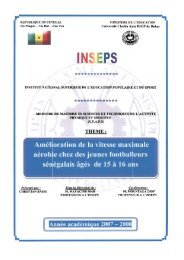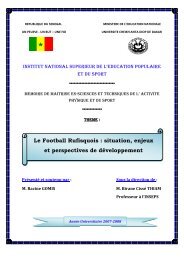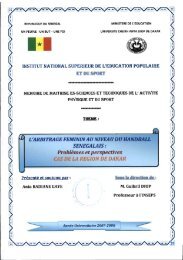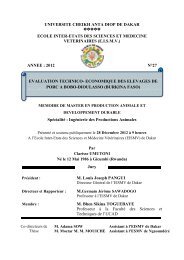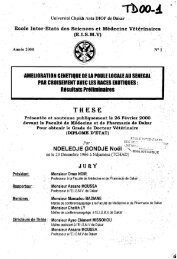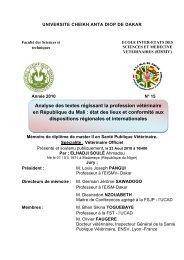Pharmacovigilance vétérinaire au Sénégal : état des lieux et ... - BEEP
Pharmacovigilance vétérinaire au Sénégal : état des lieux et ... - BEEP
Pharmacovigilance vétérinaire au Sénégal : état des lieux et ... - BEEP
- No tags were found...
Create successful ePaper yourself
Turn your PDF publications into a flip-book with our unique Google optimized e-Paper software.
<strong>Pharmacovigilance</strong> vétérinaire <strong>au</strong> Sénégal : état <strong>des</strong> <strong>lieux</strong><strong>et</strong> nive<strong>au</strong> de connaissance <strong>des</strong> vétérinaires cliniciens privésde la région de DakarMémoire de Master II Santé Publique VétérinaireRESUMELa présente étude, effectuée <strong>au</strong> Sénégal, a pour objectif de dresserl’état <strong>des</strong> <strong>lieux</strong> sur le système de pharmacovigilance vétérinaire <strong>et</strong>d’estimer le nive<strong>au</strong> de connaissance <strong>des</strong> vétérinaires cliniciens privésde la région de Dakar sur c<strong>et</strong>te problématique.L’approche méthodologique adoptée a consisté, d’une part, en uneenquête transversale exploratoire sur les textes réglementaires <strong>et</strong> lesactivités relatives à la pharmacovigilance vétérinaire <strong>au</strong> Sénégal.D’<strong>au</strong>tre part, elle a consisté en une enquête <strong>des</strong>criptive transversalepar un questionnaire <strong>au</strong>près de 28 vétérinaires cliniciens privés de larégion de Dakar, afin de recenser les eff<strong>et</strong>s indésirables ou suspicionsd’inefficacité <strong>des</strong> médicaments vétérinaires <strong>et</strong> d’estimer le degré deleur connaissance sur la pharmacovigilance vétérinaire.C<strong>et</strong>te étude révèle qu’il n’existe pas un véritable système depharmacovigilance vétérinaire <strong>au</strong> Sénégal, à c<strong>au</strong>se du vide juridiquerégnant <strong>au</strong> plan national <strong>au</strong>tour du suj<strong>et</strong>. Ce vide juridique estcomblé par une réglementation pharmaceutique vétérinairecommun<strong>au</strong>taire (de l’UEMOA) moins explicite en matière depharmacovigilance. Or, l’enquête <strong>des</strong>criptive transversale a permisde recenser 420 cas d’eff<strong>et</strong>s indésirables ou d’inefficacité présumésde médicaments vétérinaires survenus chez l’animal (97%) ou chezl’homme (3%), conduisant parfois à la mortalité animale <strong>et</strong> humaine.Ces cas, qui nécessitent la conduite d’enquête d’imputabilité, ne sontmalheureusement pas déclarés <strong>au</strong>x <strong>au</strong>torités vétérinairescompétentes. Par ailleurs, 58% <strong>des</strong> vétérinaires interrogés neconnaissent pas la notion de pharmacovigilance vétérinaire. Malgrél’absence de réglementation en matière de pharmacovigilancevétérinaire <strong>au</strong> Sénégal, 33% <strong>des</strong> cliniciens estiment que la loiorganisant la profession <strong>et</strong> la pharmacie vétérinaires <strong>au</strong> Sénégal, faitmention de la déclaration par les professionnels de santé, <strong>des</strong> eff<strong>et</strong>sindésirables présumés <strong>des</strong> médicaments vétérinaires <strong>au</strong>x <strong>au</strong>toritéscompétentes. En outre, bien que c<strong>et</strong>te loi ne dispose pas de texted’application, 68% <strong>des</strong> vétérinaires interrogés pensent qu’elle en <strong>au</strong>n qui encourage la déclaration <strong>des</strong> eff<strong>et</strong>s indésirables <strong>des</strong>médicaments vétérinaires <strong>au</strong>x <strong>au</strong>torités vétérinaires. Les dispositionsdu Règlement N° 02/2006/CM/UEMOA de l’UEMOA,encourageant la notification <strong>des</strong> eff<strong>et</strong>s indésirables <strong>des</strong> médicamentsvétérinaires par les professionnels de santé, sont méconnues par 75%<strong>des</strong> cliniciens interrogés. La presque quasi totalité <strong>des</strong> vétérinairesont éprouvé le besoin d’être informés <strong>et</strong> formés sur lapharmacovigilance.Au vu <strong>des</strong> résultats de c<strong>et</strong>te étude, la mise en place d’un système depharmacovigilance vétérinaire reposant sur <strong>des</strong> bases juridiquesnationales <strong>et</strong> commun<strong>au</strong>taires soli<strong>des</strong>, s’avère nécessaire <strong>au</strong> Sénégal.C<strong>et</strong>te mise en place doit passer par l’implication de tous les acteurs<strong>et</strong> leur sensibilisation sur l’importance de c<strong>et</strong>te pharmacovigilancevétérinaire qui a <strong>des</strong> répercussions positives sur la santé <strong>des</strong>anim<strong>au</strong>x, de l’homme <strong>et</strong> sur l’environnement.Mots-clés : <strong>Pharmacovigilance</strong> – Vétérinaire – Sénégal –Eff<strong>et</strong>s indésirables – Médicaments vétérinairesAuteur : Abdou Moumouni ASSOUMYAdresses : App 454 Cité verte, YopougonAbidjan, Côte d’Ivoire21 BP 4572 Abidjan 21ou BP 234 BongouanouTel : + 225 07 90 68 37 / 05 35 95 84Courriel : dr_assoumy@yahoo.frV<strong>et</strong>erinary pharmacovigilance in Senegal : inventory offixtures and level of knowledge of the privatev<strong>et</strong>erinarian clinicians of Dakar’s regionMaster’s Thesis in V<strong>et</strong>erinary Public HealthABSTRACTThe aim of the present study, conducted in Senegal, is to establishthe inventory of the v<strong>et</strong>erinary pharmacovigilance system and toestimate the level of knowledge of the private v<strong>et</strong>erinariansclinicians of the region of Dakar on this topic.The adopted m<strong>et</strong>hodological approach consisted, on one hand, of anexploratory transverse survey on the statutory texts and theactivities relative to the v<strong>et</strong>erinary pharmacovigilance in Senegal.On the other hand, it consisted of a transverse <strong>des</strong>criptive survey bya questionnaire with 28 private v<strong>et</strong>erinarians clinicians of Dakar’sregion, in order to list the adverse effects or the suspicions ofineffectiveness of v<strong>et</strong>erinary drugs and estimate the degree of theirknowledge on the v<strong>et</strong>erinary pharmacovigilance.This study reveals that there is no appropriate system of v<strong>et</strong>erinarypharmacovigilance in Senegal, bec<strong>au</strong>se of the lack of law reigningon the national level around the topic. This lack in the law is filledby a community v<strong>et</strong>erinary pharmaceutical regulation (of theUEMOA) less explicit in pharmacovigilance. Now, the transverse<strong>des</strong>criptive survey allowed to list 420 cases of adverse reactions orineffectiveness of v<strong>et</strong>erinary drugs arising at the animal (97%) or atthe human (3%), som<strong>et</strong>imes leading to the animal and humanmortality. These cases, which require the conducting of a survey ofimputability, are not unfortunately indicated to the comp<strong>et</strong>entv<strong>et</strong>erinary <strong>au</strong>thorities.Besi<strong>des</strong>, 58% of the questioned v<strong>et</strong>erinarians don’t know the notionof v<strong>et</strong>erinary pharmacovigilance. In spite of the absence of law inv<strong>et</strong>erinary pharmacovigilance in Senegal, 33% of the cliniciansconsider that the law organizing the v<strong>et</strong>erinary profession andpharmacy in Senegal, mentioned the declaration of adverse effectsor ineffectiveness of v<strong>et</strong>erinary drugs by the professionals of healthto the comp<strong>et</strong>ent <strong>au</strong>thorities. Although this law hasn’t anapplication’s test, 68% of the questioned v<strong>et</strong>erinarians think that ithas an application’s test which encourages the declaration ofadverse effects or ineffectiveness of v<strong>et</strong>erinary drugs to thev<strong>et</strong>erinary <strong>au</strong>thorities. The measures of UEMOA’s Regulation N°02/2006/CM/UEMOA encouraging the announcement of adverseeffects or ineffectiveness of v<strong>et</strong>erinary drugs by the professionals ofhealth, are underestimated by 75% of the questioned clinicians.The great majority of the v<strong>et</strong>erinarians felt the need to be informedand trained on the v<strong>et</strong>erinary pharmacovigilance.In view of the results of this study, the implementation of a systemof v<strong>et</strong>erinary pharmacovigilance resting on solid national andcommunity legal bases, is necessary for Senegal. Thisimplementation needs the implication of all the actors and theirsensitization on the importance of this v<strong>et</strong>erinarypharmacovigilance which has positive repercussions on the healthof animals, humans and on the environment.Keywords : <strong>Pharmacovigilance</strong> – V<strong>et</strong>erinary – Senegal – Adverseeffects – V<strong>et</strong>erinary drugsAuthor : Abdou Moumouni ASSOUMYHome adress : App 454 Cité verte, YopougonAbidjan, Côte d’Ivoire21 BP 4572 Abidjan 21or BP 234 BongouanouTel : + 225 07 90 68 37 / 05 35 95 84E-mail : dr_assoumy@yahoo.fr



